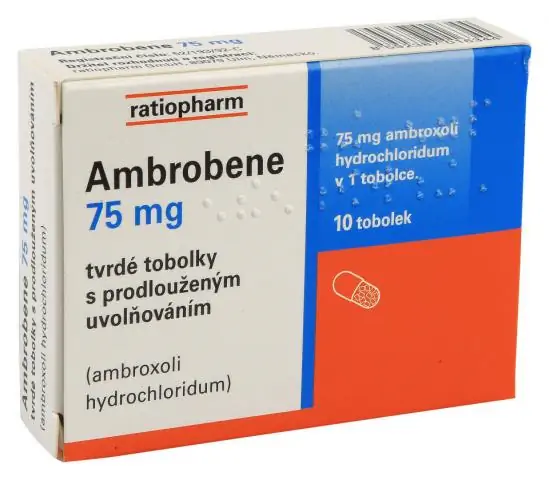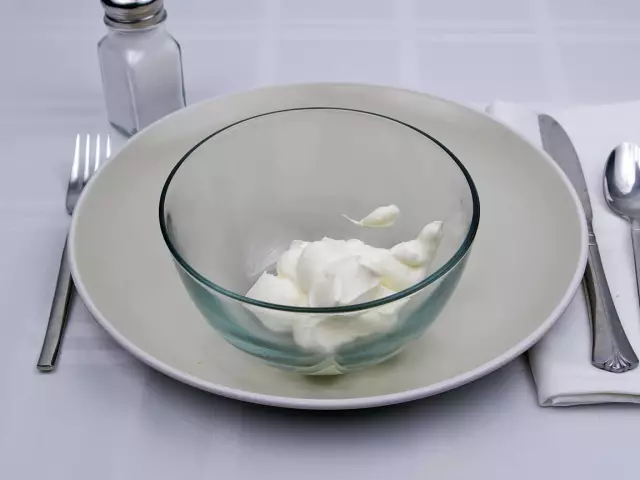- Author Rachel Wainwright wainwright@abchealthonline.com.
- Public 2023-12-15 07:39.
- Last modified 2025-11-02 20:14.
Micoderil
Mikoderil: instructions for use and reviews
- 1. Release form and composition
- 2. Pharmacological properties
- 3. Indications for use
- 4. Contraindications
- 5. Method of application and dosage
- 6. Side effects
- 7. Overdose
- 8. Special instructions
- 9. Application during pregnancy and lactation
- 10. Use in childhood
- 11. Drug interactions
- 12. Analogs
- 13. Terms and conditions of storage
- 14. Terms of dispensing from pharmacies
- 15. Reviews
- 16. Price in pharmacies
Latin name: Mycoderil
ATX code: D01AE22
Active ingredient: Naftifin (Naftifine)
Producer: Pharmstandard-Tomskkhimfarm, JSC (Russia), LEKKO, JSC (Russia), Pharmstandard-Leksredstva (Russia)
Description and photo update: 2018-25-10
Prices in pharmacies: from 286 rubles.
Buy

Mikoderil is an antifungal agent for external use.
Release form and composition
- cream for external use 1%: uniform consistency, white, with a weak specific odor (10, 15, 20, 25, 30, 40, 50 and 100 g in aluminum tubes, each tube is placed in a cardboard box);
- solution for external use 1%: colorless or slightly yellowish, transparent, with the smell of ethanol (10 and 20 ml in dark glass dropper bottles, each bottle is placed in a cardboard box).
Composition of 1 g of cream:
- active substance: naftifine hydrochloride - 10 mg;
- additional components: isopropyl myristate - 80 mg, cetostearyl alcohol - 80 mg, polysorbate 60 - 61 mg, cetyl palmitate - 20 mg, sorbitan stearate - 19 mg, benzyl alcohol - 10 mg, sodium hydroxide - 1.2 mg, purified water - up to 1000 mg.
Composition of 1 ml solution:
- active substance: naftifine hydrochloride - 10 mg;
- additional components: ethyl alcohol 95% (ethanol) - 400 mg, propylene glycol - 50 mg, purified water - up to 1 ml.
Pharmacological properties
Pharmacodynamics
Naftifine - the active ingredient of Mikoderil - is an antifungal agent belonging to the class of allylamines.
The mechanism of its action is due to the ability to inhibit squalene-2,3-epoxidase, as a result of which the formation of ergosterol, which is part of the cell wall of the fungus, decreases. Naftifine affects squalene epoxidase and does not affect the cytochrome P 450 system.
The drug is active against molds (Aspergillus), dermatophytes (Microsporum, Epidermophyton, Trichophyton), yeast and yeast-like fungi (Candida spp., Pityrosporum), as well as some other types of fungi (for example, Sporothrix schenckii).
Naftifine has a fungicidal effect on dermatophytes and molds, and has a fungicidal or fungistatic effect on yeast fungi, depending on the strain of the microorganism.
Has antibacterial activity against gram-negative and gram-positive microorganisms that cause the development of secondary bacterial infections.
Due to its anti-inflammatory properties, the drug contributes to the rapid disappearance of symptoms of inflammation, especially itching.
Pharmacokinetics
When applied externally, a cream or solution, naftifine quickly and well penetrates the skin and creates stable antifungal concentrations in its various layers, so that the drug can be applied once a day.
Systemic absorption is less than 6% of the dose of Micoderil. The absorbed amount of the drug is partially metabolized. It is excreted through the intestines and kidneys. The half-life is 2-3 days.
Indications for use
For both dosage forms:
- candidiasis of the skin;
- fungal infections of smooth skin and skin folds (tinea corporis, tinea inguinalis);
- inflammatory dermatomycosis (including with itching);
- pityriasis versicolor;
- interdigital mycoses (tinea manum, tinea pedum);
- fungal infections of the nails (onychomycosis).
The solution for external use is also used to treat mycoses affecting areas of the skin with hyperkeratosis (pathological thickening of the stratum corneum of the epidermis), as well as in the hair growth zone.
Contraindications
For cream and solution:
- pregnancy and lactation;
- hypersensitivity to drug components.
Additionally for mortar:
- the presence of wounds in the intended site of application of the product;
- hypersensitivity to propylene glycol.
Micoderil is used with caution in pediatrics.
Instructions for the use of Mikoderil: method and dosage
Micoderil is used externally.
In case of skin candidiasis and dermatomycosis, the cream / solution should be applied to previously cleaned and dried affected areas and the healthy skin areas connected to them, capturing about 1 cm along the edges of the affected area. The frequency of application is 1 time per day. Treatment of candidiasis takes 4 weeks, dermatomycosis - 2-4 weeks (in some cases - 8 weeks).
With onychomycosis (fungal infection of the nails), Mikoderil is applied 2 times a day. Before the first use, it is necessary to remove the affected parts of the nails as much as possible with scissors or a file. The duration of treatment is individual, it can be 6 months. To prevent relapse, therapy is recommended to continue for at least 2 weeks after the disappearance of the clinical symptoms of the disease.
Side effects
Micoderil is generally well tolerated. In rare cases, local reactions such as dryness, burning and flushing of the skin occur. These phenomena are reversible; treatment cancellation is not required.
Overdose
Overdose cases have not been reported.
special instructions
According to the instructions, Micoderil is not intended for use in ophthalmology.
Treatment with the drug is carried out in courses.
Care should be taken when applying the ointment / solution to avoid contact with open wounds.
Influence on the ability to drive vehicles and complex mechanisms
Considering the external method of using the drug, Mikoderil does not adversely affect the speed of reactions and the ability to concentrate, therefore it can be used by patients regardless of their area of professional employment.
Application during pregnancy and lactation
The safety profile of naftifine when used during pregnancy and lactation has not been studied, therefore Mikoderil is contraindicated in women during these periods of life.
Pediatric use
Clinical experience with the use of naftifine in children and adolescents is limited, therefore Micoderil is used with caution in pediatrics.
Drug interactions
The interaction of Mikoderil with its simultaneous use with other drugs has not been noted.
Analogs
The analogues of Mikoderil are Exostat and Exoderil.
Terms and conditions of storage
Shelf life - 2 years, subject to the storage conditions recommended by the manufacturer: temperature no more than 25 ° C.
Keep out of the reach of children.
Terms of dispensing from pharmacies
Available without a prescription.
Reviews about Micoderil
According to reviews, Mikoderil is an effective antifungal agent. An additional advantage is considered to be a lower price compared to imported analogues.
The disadvantages of the drug include a slow action, which requires long-term therapy, in some cases (with damage to the nail plates) - up to 6 months.
There are some reviews that describe the ineffectiveness of this antimycotic agent. Patients indicate a weak severity of the action of Mikoderil in advanced cases due to the low concentration of the active substance (1%).
The price of Micoderil in pharmacies
The price of Micoderil, depending on the form of issue: 405-480 rubles. for 1 bottle of solution with a volume of 10 ml, 680-870 rubles. for 1 bottle of solution with a volume of 20 ml, 300-315 rubles. for a tube of cream with a volume of 15 g.
Micoderil: prices in online pharmacies
|
Drug name Price Pharmacy |
|
Mikoderil 1% cream for external use 15 g 1 pc. 286 r Buy |
|
Mikoderil 1% solution for external use 10 ml 1 pc. 384 r Buy |
|
Micoderil cream 1% 15g 410 RUB Buy |
|
Mikoderil solution outside. approx. 1% 10ml 430 RUB Buy |
|
Mikoderil 1% solution for external use 20 ml 1 pc. 430 RUB Buy |
|
Mikoderil cream for outside. approx. 1% tube 30 g RUB 478 Buy |
|
Mikoderil 1% cream for external use 30 g 1 pc. RUB 478 Buy |
|
Mikoderil solution outside. approx. 1% 20ml RUB 916 Buy |
| See all offers from pharmacies |

Anna Kozlova Medical journalist About the author
Education: Rostov State Medical University, specialty "General Medicine".
Information about the drug is generalized, provided for informational purposes only and does not replace the official instructions. Self-medication is hazardous to health!






